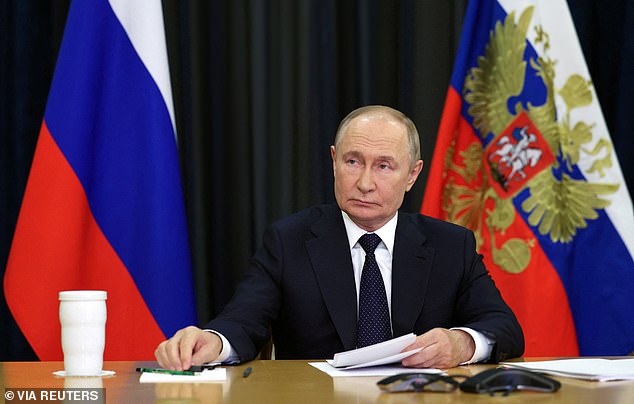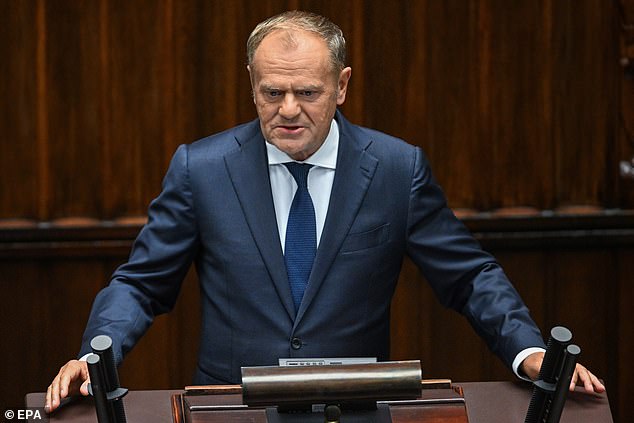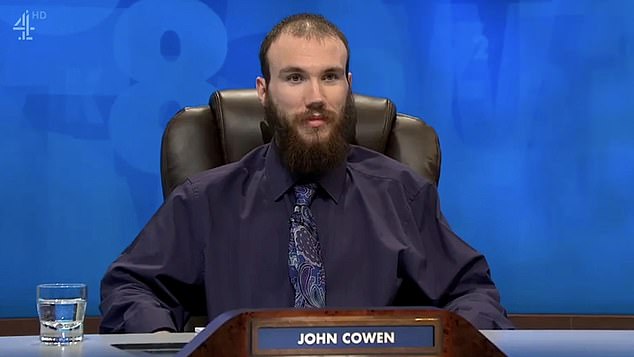Russia’s overnight drone incursion across eastern Poland has sparked fears of a war even bigger than Vladimir Putin’s bloody invasion of Ukraine.
Ever since Russian tanks first rolled into Ukraine in 2022, Western strategists have asked the same question: who will the Kremlin target next?
Until today, the consensus was clear. Small, militarily weak nations on Russia’s border – the Baltic states, for example – looked the most likely ‘soft’ targets.
Poland, by contrast, seemed a far tougher prospect. With a population the size of Spain’s and a rapidly modernising military, Warsaw boasts the second-largest standing army in Nato after Turkey – double the size of France’s or Germany’s. Britain’s 76,000 troops may be first-class, but Poland boasts over 300,000 more troops and spends almost 5 per cent of its GDP on defence. It has splashed out on cutting-edge American fighters and hundreds of South Korean tanks.
But last night, the Polish military recorded 19 drone incursions in the country’s airspace overnight – many from Belarus. Prime Minister Donald Tusk revealed this morning that three or four drones were shot down by Polish and Nato aircraft that were scrambled to deal with the threat.
Russia’s allies in Belarus have tried to dismiss today’s drone attacks as an ‘accident’. But no-one in Warsaw is fooled: one drone could be interpreted as a mistake – but so many, at the same time?
No, this is a deliberate test by Putin of Nato’s resolve. But the despot may have bitten off more he can chew.

Russia’s overnight drone incursion across eastern Poland has sparked fears of a war even bigger than Vladimir Putin’s bloody invasion of Ukraine
As a member of Nato, Poland is protected under Article 5, which states that an attack on one member is an attack on all. The alliance will be meeting today to discuss how to respond, a spokesman has said.
Moscow will surely be watching not just Poland, but the Alliance’s 30 other members. Who are the weak links? Will Poland and other frontline NATO states – from Finland through the Baltics to Romania – receive more than words of reassurance from America and western Europe?
Three years ago, Putin disastrously underestimated Ukraine’s determination to resist Russia’s onslaught. He could now be making the same mistake about Poland.
In Western Europe, opinion polls show only a lukewarm willingness among younger generations to fight for their homelands. In Poland, by contrast, young people are steeled by history.
Britons may not need reminding that the Second World War began with Hitler’s invasion of Poland in September 1939. What is often forgotten, however, is that two weeks later Stalin’s Kremlin marched in from the east, carving up the country with the Nazis.

Donald Tusk chillingly warned this morning that ‘we are closer to war than any time since the Second World War’
For Poles, that act of betrayal remains seared into the national memory. Their greatest catastrophe – in which 30 per cent of the population perished – was born of collusion between Berlin and Moscow.
Worse, in 1944, when Poles rose against their Nazi occupiers in Warsaw, Stalin halted the Red Army’s pursuit of the defeated Nazi army at the outskirts of Warsaw. He even denied British and American planes permission to drop aid over the territory. Hitler’s forces butchered 250,000 before blowing the capital to rubble – before Stalin’s troops then marched as supposed ‘liberators’.
So for Poles, their country’s tragedy was as much Moscow’s fault as Berlin’s. And for the Russians, this is not just politics but a grudge match born of centuries of bloodshed.
Putin may also be gambling that recent quarrels between Poles and Ukrainians – over historic grievances and Warsaw’s refusal to send troops to a European peacekeeping force in Ukraine – reflect Polish reluctance to stand up for their own country. He is likely to find out just how wrong he is.
Now the question is whether Europe will stand shoulder-to-shoulder with Poland. Will Nato’s ‘awkward squad’ – Slovakia and Hungary – back their EU ally, or will leaders Robert Fico and Viktor Orbán keep buying Russian oil and blocking firm EU action?
Donald Tusk chillingly warned this morning that ‘we are closer to war than any time since WW2’. Indeed, the crisis puts Donald Trump’s crisis-management skills on the line.
Tough talk will not be enough. Nor will sweet-talking Putin. Only American backbone can keep the peace – and stop Europe sliding into a wider war.












